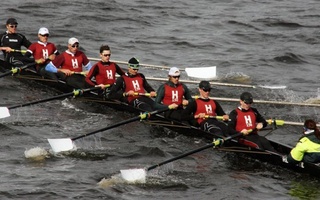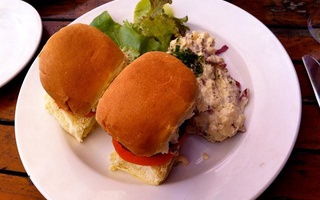A friend of mine from home is a self-proclaimed metrosexual. You know those Von Dutch hats that Paris Hilton wears. When you see them in the store, you wonder: Who’d ever spend fifty bucks on that? Well the answer is, he would. He’s the kind of guy that spends his Saturday afternoons shopping downtown, dropping hundreds of dollars on designer jeans, shoes, belts and whatever other must-have accessories for the self-proclaimed metrosexual he can find. And what is most surprising is that this nameless friend—a football player for University of Maryland—doesn’t really fit the stereotype of someone particularly “fashion-conscious.” Yet, he’s still been sucked in by the trend.
The term “metrosexual” first became popular when David Beckham dubbed himself a member of this elusive breed in a British men’s magazine. The fact that a popular, heterosexual male could be in touch with his feminine side and still be married—to the former lead singer of the Spice Girls—gave metrosexuality the legitimacy it needed. This legitimacy was further cemented by the success of the TV show “Queer Eye For The Straight Guy,” in which five gay men makeover a heterosexual man, teaching him how to dress and act more fashionably. Since then, the metrosexual craze has truly taken off and the sales of exfoliating moisturizers and charcoal-based conditioners that detoxify the scalp have never been the same.
A recent episode of “South Park” parodied this new nationwide phenomenon. In the episode Stan, Kyle, Kenny and Cartman turn metrosexual—trading their hooded jackets for tight T-shirts and gelled hair. At first their mothers and the women in general take a liking to this change in appearance and attitude. However, as things progress, they come to notice the dark underside of this fad. The men of South Park have become so concerned with making it to the next shoe sale and keeping up their fabulous look that they stop paying attention to the women and lose sight of their own masculinity. The metrosexualization of the show’s male population provides an opening for a group of effeminate alien creatures called Crab People, who then proceed to try and take over the planet.
Although the episode eventually degenerates into mayhem, Matt Stone and Trey Parker, the show’s creators, have a good point. There is something decidedly unnatural about this new trend. While metrosexuality might bring about improvements in hygiene, it does so at a cost. It alters standard male behavior and propels male narcissism to new heights. That’s not to say that male narcissism is confined to metrosexuals; yet, metrosexuality does offer it an overt celebration by emphasizing the importance of physical appearance. As a result, guys stop gazing in admiration of female beauty and become fixated on themselves.
As Tyler Durden points out in the film Fight Club, the modern male feels alienated because he is led to believe that his self worth is determined by his name-brand underwear and the interior design of his apartment. Although it may lead to superior style and more urban tastes, metrosexuality is a dead-end on the road to rediscovering a healthy masculinity. We need this sense of male identity if we are going to survive in a future that relies increasingly less on those traits unique to our sex. If we don’t rediscover this healthy male identity, who knows—the Crab People might emerge from underground and conquer earth.
Brian A. Finn ’06, a Crimson business editor, is an economics concentrator in Lowell House.
Read more in Opinion
Senior Gift ShenanigansRecommended Articles
-
A Voice of One's OwnT O READ Margaret Atwood's own voice--as opposed to one of the many voices of her fictional and poetic personae--is
-
Gadfly: This Week in BuzzLESS FUNNY, MORE SAD Lynn Cheney, Joe Lieberman, and Tipper Gore, you triumvirate of wisdom, you: the moment of vindication
-
SPOTLIGHT: Morgan A. Kruger '07The Hasty Pudding Theatricals (HPT) aren’t just a transvestite’s game. Morgan A. Kruger ’07, a history and literature concentrator from
-
 Sprint to the Finish
Sprint to the Finish -
 The Red House Review
The Red House Review -
SPORTS BRIEF: Men's Heavyweight Crew Continues Undefeated SeasonThey say 16 is the sweetest. Such was true as the No. 2 Harvard heavyweight men’s crew team bested both No. 4 Northeastern and Holy Cross in five races on Saturday on the Charles River. The wins allowed the Crimson to capture the 16th straight Smith Cup over its cross-town rivals.













